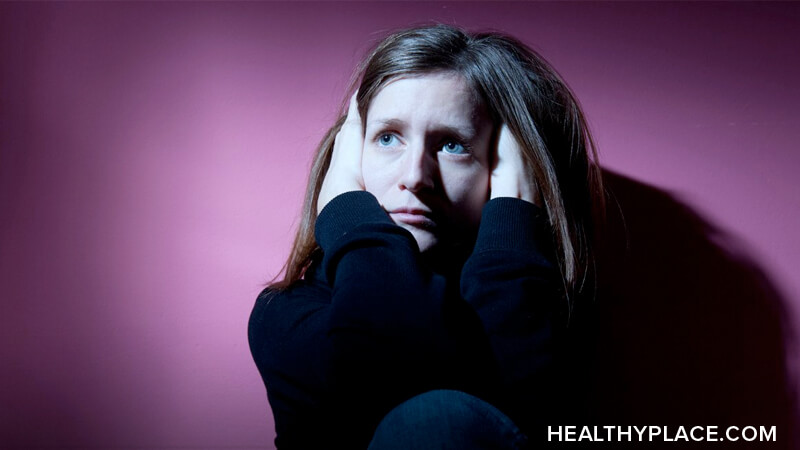What Are the Symptoms of Mental Illness?

Symptoms of mental illness are plentiful; indeed, mental illness is far from a silent illness that just does its thing quietly in the background. Mental illness symptoms feel loud, obtrusive, disruptive, and emotionally and even physically painful. Even before full-blown symptoms of mental illness appear, there are early warning signs of mental illness that either the person or others around the person begin to notice.
Mental disorders have signs that are observable by other people, and they have symptoms that are experienced subjectively by the individual. Knowing the symptoms of mental illness helps people communicate with a mental health care professional so he or she can work with you to determine what is happening. (Types of Mental Health Doctors and How to Find One)
A Mental Illness Symptom Checker
A mental illness symptom checker is a list of some of the main symptoms associated with a given mental disorder. While symptom checkers can't diagnose, they can provide a list of symptoms as a tool for checking mental illness symptoms against a list of diagnostic criteria. For example, the HealthyPlace online psychological tests, act as a symptom checker.
Here is a list of some of the most common mental illness categories and their main symptoms (note that individual disorders within each category have their own specific symptoms. You can find a list of mental illnesses here.)
Anxiety disorders
- excessive worry and fear, either generalized or specific to a situation
- restlessness, feeling on edge or keyed up
- irritability
- difficulty concentrating
- sleep disturbances
- ruminations (recurring thoughts, worries, and fears)
- physical disturbances, such as heart palpitations, chest pain, sweating, shaking, respiratory problems, digestive problems, etc.) for which doctors can't find a medical explanation
(Find out what an anxiety disorder is, more details on anxiety disorder symptoms and see all anxiety disorder articles.)
Depressive disorders
- prolonged low/depressed/sad mood
- loss of interest in activities once enjoyed
- change in sleep patterns, either too much or too little
- fatigue
- weight gain or loss
- indecisiveness, problems with thinking and concentrating
- sense of worthlessness and hopelessness
- thoughts of dying
(What is major depression? Find out about important depression symptoms you should be aware of and read detailed depression information articles.)
Bipolar disorders
- feelings of grandiosity (hugely inflated self-concept)
- decreased need for sleep
- risky behaviors such as excessive spending, promiscuity, etc.)
- pressure to talk
- racing thoughts
- distractibility
- difficulty concentrating
- increase in goal-directed activity
(Learn about bipolar disorder. Get a complete understanding of bipolar disorder symptoms. View a list of all HealthyPlace bipolar disorder articles for detailed information.)
Obsessive-compulsive disorder (OCD)
- obsessions, or recurring thoughts that are intrusive, unwanted, and create anxiety or distress;
- compulsions, or repetitive behaviors (hand washing, checking, ordering, etc.) and/or mental acts (counting, praying, silently repeating words) as a way to stop the obsessions
- the obsessions or compulsions are time-consuming and significantly interfere in functioning
(What is OCD? Get details on OCD symptoms and read in-depth OCD articles for further information.)
Attention-deficit/hyperactivity disorder (ADHD)
- a persistent pattern of inattention and/or hyperactivity-impulsivity that disrupts functioning and, in children and teens, development
- lack of attention to detail
- difficulty paying attention
- seems not to listen, is easily distracted
- problems following through with instruction
- forgetfulness
- difficulty organizing and keeping track of things
- difficulty sitting still
- restlessness/need to run, climb, move
- excessive talking, blurting things out/interrupting
(Read about ADHD, ADD in children and ADHD adults. Details on ADHD signs and symptoms and a complete list of ADD, ADHD articles here.)
Eating disorders—anorexia nervosa
- minimal eating, calorie intake significantly less than daily requirements for health
- low weight
- distorted sense of body image
(Anorexia is the most deadly mental illness. What is anorexia nervosa? See a complete list of anorexia symptoms and all articles on anorexia.)
Eating disorders—bulimia nervosa
- binge eating, involving eating large quantities of food in a short amount of time
- sense of lack of control over eating, inability to stop eating or control how much is eaten
- recurrent behaviors to compensate for the binge eating, such as self-induced vomiting, misuse of laxatives or diuretics, or excessive exercise
- self-concept is tied to perceived body image, shape, weight
(What is bulimia nervosa? Take a comprehensive look at the symptoms of bulimia. And read in-depth articles on bulimia for more information.)
Schizophrenia spectrum disorders
- positive symptoms, or things added to the person: hallucinations, delusions, disorganized speech, disorganized or catatonic behavior
- negative symptoms, or things taken away from the person: flat affect/emotions, avolition (apathy/lack of motivation, desire, drive)
(Schizophrenia is a difficult mental illness to live with. What is schizophrenia? Learn about schizophrenia symptoms and their impact on everyday life. Plus read all schizophrenia spectrum disorder articles.)
Meaning of Symptoms of Mental Illness
When considering specific symptoms of mental illness, it's important to keep certain things in mind. Of course the symptoms of mental illness themselves are important, but to truly be a mental illness rather than extreme distress, professionals look deeper than a checklist of symptoms to consider just how they disrupt someone's life.
Doctors and other mental health providers (Types of Mental Health Counselors: Finding a Good One) work with a person to determine
- severity of the mental illness symptoms: the degree of disruption, dysfunction, and disability (severity ranges from mild to severe)
- duration: how long the symptoms of mental illness have been present
- pervasiveness: do the symptoms impact all aspects of one's being (thoughts, feelings, and behaviors) and life in general; how much do they cause physical symptoms
The more precisely you're aware of your mental illness symptoms, the better able you'll be to communicate what you're dealing with. This means that you and your mental health care provider can determine the best possible treatment plan so you can define new goals, get back into life, and transcend mental illness symptoms.
APA Reference
Peterson, T.
(2019, October 23). What Are the Symptoms of Mental Illness?, HealthyPlace. Retrieved
on 2026, March 5 from https://www.healthyplace.com/other-info/mental-illness-overview/what-are-the-symptoms-of-mental-illness



